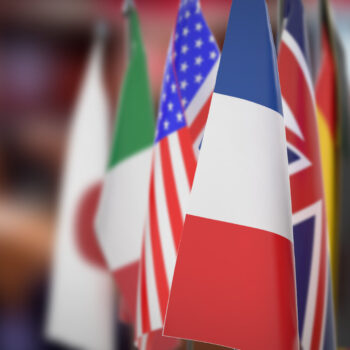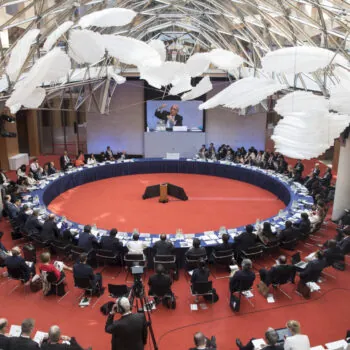As over 180 leaders arrived in Paris to kick off COP21, E3G navigate the hubbub to highlight the key political signifiers from the flurry of announcements.
Politics over pageantry
Leaders’ speeches were far more political in content than we usually see at this type of ceremonial occasion. India set the tone for this through a pre-emptive round of ministerial interviews before the COP formally opened, culminating with Prime Minister Modi’s op-ed in the Financial Times. Calling for countries to ‘meet our need for clean energy and healthy habitats in a spirit of partnership, not put nations on different sides’, this media strategy aimed to explain India's position and denied India will block the talks. However, this has had the perverse effect of increasing global media scrutiny and discussion of India's role in the negotiations.
G2 show they’re listening
There were strong performances from Obama and Xi on the opening day. Both leaders were clearly aiming to help smooth the path for the next two weeks, using their speeches to address the core elements of contention in the negotiations and particularly speaking to the concerns of vulnerable and least developed countries.
Obama announced action in two areas where the US has traditionally taken a tough line in international climate talks. He pledged support to vulnerable countries on resilience and insurance against extreme weather, addressing concerns on Loss and Damage from climate change – an area where the US has blocked progress in formal negotiations. He also announced a major initiative on clean technology that includes India and other developing countries, addressing a core Indian ask in the negotiations which the US has traditionally been inflexible on. These moves show a real effort is underway to move past traditional impasses in the formal negotiations by legitimising other countries’ concerns and finding ways to address them outside the talks.
Xi managed to tread a careful line between showing willingness to cut emissions while not alienating his traditional negotiating partners in developing countries. He did however emphasise the radical steps that China is making at home to drive low carbon growth, and recommitted to putting this at the heart of China’s economic reforms.
On the money
Xi broke new ground by announcing a comprehensive range of low carbon co-operation with developing countries covering 100 clean energy projects, ten low carbon industrial parks, smart cities and access to finance for clean energy. China has strongly resisted taking formal financial obligations to help poorer countries within the UNFCCC, and this has caused tensions with the US, EU and Japan – especially as China and other countries are asking for these countries to commit to UN-monitored finance to be scaled up beyond $100bn a year after 2020.
By showing Chinese flexibility on providing support for developing countries in practice, Xi has made it easier for developed countries to pledge to increase funding after 2020. He has also given developing countries more confidence that new funding will appear, and positioned China to benefits from the fast-growing low carbon exports to emerging economies.
This more positive dynamic on finance was further boosted by a coalition of developed countries, including the US, Canada and European states, announcing financial pledges for adaptation action through the Least Developed Countries Fund.
Cost of inaction outweighs cost of action
Obama and others have been clear that there is no fundamental conflict between dealing with climate change and economic development. Obama emphasised the trend of ‘decoupling’, pointing out that global emissions were flat last year even though the economy grew. Djibouti’s President affirmed that “no growth can replace the loss that we will face through climate change,” refuting the idea that economic arguments could be used to jeopardise the fate of the planet. Dilma Rousseff added a heavyweight emerging economy voice to this message, describing how decarbonisation of the Brazilian economy will go hand in hand with eradicating poverty, and issued a call to arms for all countries to pursue a low carbon future while enabling development.
100% champions
Vulnerable countries issued a powerful call for the world to embrace a global transition to 100% clean energy. The day after climate marches around the world colourfully called for ‘100% clean’, leaders from Pacific islands emphasised that the Paris Agreement must signal the end of the fossil fuel era. The united stance of the Climate Vulnerable Forum, whose message was amplified by civil society groups, will increase pressure on other countries to be ambitious in Paris, standing up to the urgency and severity of the climate threat.
Reining in rogue behaviour
Taking place amidst a range of live geopolitical tensions, Vladimir Putin’s speech soothed concerns these could bleed into the Paris talks. His positive speech affirmed that Russia does not intend to block the talks, limiting the likelihood of Russia’s previously disruptive behaviour in the climate talks to resurface.
Political risk and opportunity
Several leaders including Obama talked about being at a turning point in the global response to climate change. Leaders are showing that the political risks of inaction are rising while the political risks of climate action are falling as low carbon energy costs come down. A striking number of the leaders have emphasised the widespread opportunities of the low carbon transition. Leaders’ statements today have signalled a clear shift is taking place in the political debate on climate. Tackling climate change is no longer simply an effort trying to stop something bad: carbon pollution. It is increasingly about accelerating the deployment of something good: clean, smart low carbon energy.


